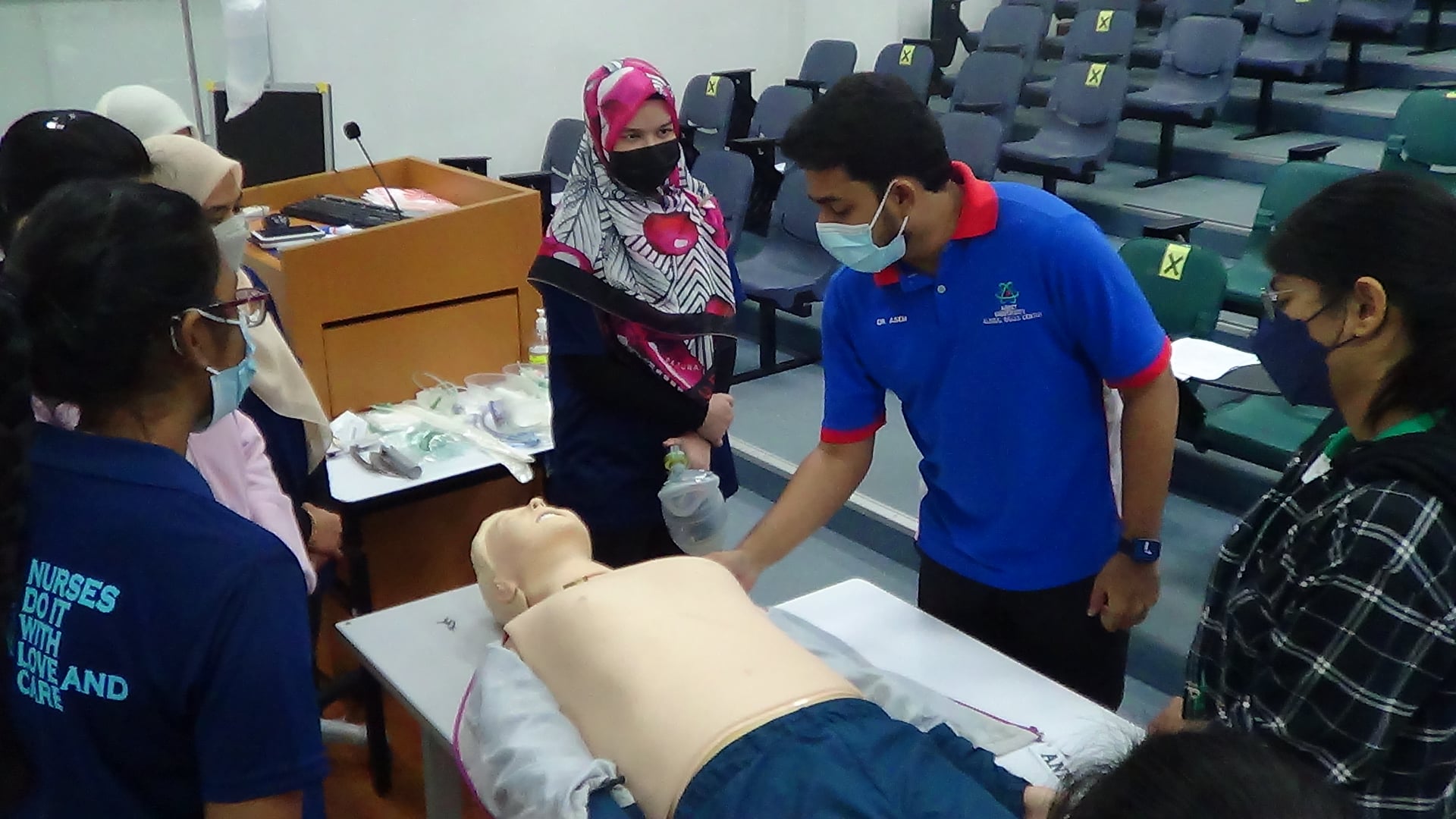KPT PACE Programme
 In November 2021, the Centre for Lifelong Learning (CLL) AIMST University has secured a grant from the Malaysian Government under the KPT PACE programme.
It is a collaborative programme by CLL, the Clinical Skills Centre, School of Nursing and Gleneagles Hospital.
The training was successfully conducted from 17 December 2021 to 19 December 2021.
As a result, 23 Diploma in Nursing students were trained and certified to be American Heart Association (Advanced Cardiovascular Life Support) providers.
The students will be assured jobs by the Gleneagles Hospital in Penang upon graduation.
Click here to view more photos.
For more info about CLL programmes, click here
In November 2021, the Centre for Lifelong Learning (CLL) AIMST University has secured a grant from the Malaysian Government under the KPT PACE programme.
It is a collaborative programme by CLL, the Clinical Skills Centre, School of Nursing and Gleneagles Hospital.
The training was successfully conducted from 17 December 2021 to 19 December 2021.
As a result, 23 Diploma in Nursing students were trained and certified to be American Heart Association (Advanced Cardiovascular Life Support) providers.
The students will be assured jobs by the Gleneagles Hospital in Penang upon graduation.
Click here to view more photos.
For more info about CLL programmes, click here
People Who Are Bullied Online Are Likely to Be Bullied in Person Too
‘People who are bullied online are likely to be bullied in person too’ is an article by Dr Saraswathi Bina Rai, Associate Professor at the Faculty of Medicine, AIMST University. According to her, one needs to know the various forms of cyberbullying before identifying when it occurs. Cyberbullying, which affects victims mentally, emotionally and physically, is not significantly addressed as sometimes it is too subtle to be recognised. The article got featured on NST’s ‘Letters to the Editor’ column on 13 December 2021. Click HERE to read.
Make Technology Senior-friendly
Technology can neither ruin an elderly’s life nor make it more complicated. It’s the other way around. Technology can help them become more informed to make better, sound decisions. Seniors should embrace it. In line with this, Associate Professor Dr Yu Chye Wah, Dean at the Faculty of Allied Health Professions, AIMST University, has developed five strategies to enhance the usability and adoption of technology among senior citizens. The article got featured in the columnist section of NST on 11 December 2021. Click HERE to read.
SUREWORK EDUCATION FAIR
Venue: MID VALLEY EXHIBITION CENTRE, KUALA LUMPUR Date: 11 & 12 December 2021 Time: 11am -6pm
YOU CAN CHOOSE NOT TO BE LONELY
Decelerate Before It is Too Late
Global warming and extreme weather patterns are affecting the citizens of the world. Hence, solar panels, wind energy and even nuclear energy should be the alternative and as strategies to slow down climate change. In addition, forest preservation and cleaner fuel should be the way of tomorrow. Professor Datuk Dr. John Antony Xavier, Vice-Chancellor of AIMST University, has come up with an article that resonates with the importance of collective responsibility to ‘decelerate’ climate change. The article got featured in the columnist section of NST on 7 December 2021. Click HERE to read.
ComBio ACADEMICIANS APPOINTED AS RESEARCHERS BY GLOBE INSTITUTE
 Our academicians from AIMST University’s Centre of Excellence for Omics-Driven Computational Biodiscovery (COMBio), Dr. Heera Rajandas and Dr. Sivachandran Parimannan have been appointed as affiliate/associate researchers by Globe Institute, University of Copenhagen under the Computational Biodiscovery section led by Prof. Thomas Sicheritz-Ponten for 3 years (15 October 2021 till 14 October 2024).
It is a proud moment for AIMST University as Globe Institute is a globally renowned research centre while University of Copenhagen is ranked 79 in the QS world ranking. This is the 2nd appointment as they were appointed as honorary fellows by Deakin University, Australia in 2020, aside from being partners to the University of Leicester, Phage Lab. The appointment will enable joint grant applications, access to facilities at Globe Institute, and staff and student mobility opportunities. It is another milestone for AIMST University.
AIMST University staff and students congratulate both of them for their remarkable achievement and wish them success in their future endeavours.
Click HERE to know more about COMBio.
#aimst
#ComBio
#achivement
Our academicians from AIMST University’s Centre of Excellence for Omics-Driven Computational Biodiscovery (COMBio), Dr. Heera Rajandas and Dr. Sivachandran Parimannan have been appointed as affiliate/associate researchers by Globe Institute, University of Copenhagen under the Computational Biodiscovery section led by Prof. Thomas Sicheritz-Ponten for 3 years (15 October 2021 till 14 October 2024).
It is a proud moment for AIMST University as Globe Institute is a globally renowned research centre while University of Copenhagen is ranked 79 in the QS world ranking. This is the 2nd appointment as they were appointed as honorary fellows by Deakin University, Australia in 2020, aside from being partners to the University of Leicester, Phage Lab. The appointment will enable joint grant applications, access to facilities at Globe Institute, and staff and student mobility opportunities. It is another milestone for AIMST University.
AIMST University staff and students congratulate both of them for their remarkable achievement and wish them success in their future endeavours.
Click HERE to know more about COMBio.
#aimst
#ComBio
#achivement
FACING UP NEW VARIENT

Booster Dose Among Five Vital Measures to Fight Covid-19
Senior Professor M. Ravichandran, Dean of the Faculty of Applied Sciences and Chairman of the Covid-19 Task Force AIMST University has listed five measures that can help us deal with the Covid-19 situation apart from strictly following the SOP, ventilating our workplace and home, and taking the booster dose. The article ‘Booster dose among five vital measures to fight Covid-19’ got featured in the columnist section of NST on 29 November 2021. Click HERE to read.
MOU WITH TECH DOME PENANG

 On 25 November 2021, AIMST University signed MoU with Tech Dome Penang. The significant event was held at Tech Dome, Penang and it was attended by Prof. Datuk Dr. John Antony Xavier, Vice-Chancellor & Chief Executive of AIMST University, Assoc. Prof. Dr. Venkata Suresh Babu, Deputy Vice-Chancellor Research and Industrial Relations AIMST University, Prof. Manickam Ravichandran, Dean, Faculty of Applied Sciences AIMST University and YB Prof. Dr. P. Ramasamy, Deputy Chief Minister II of Penang and Mr. Khoo Boo Wooi, the CEO of Tech Dome and staff members of Tech Dome.
Tech Dome Penang is a museum offering interactive science and technology exhibits, including astronomical observations using telescopes. It is a not-for-profit organisation located at KOMTAR, Penang. It houses innovative science displays and runs education and other STEM and entrepreneurship-related programmes.
This collaboration will help AIMST University and Tech Dome promote and organise joint science, technology, engineering, and mathematics (STEM) promotional programmes. Tech Dome agreed to provide a space at Tech Dome to exhibit AIMST Research and Innovations.
YB Prof. Dr. P. Ramasamy was very supportive of this collaboration, and he will continue to assist AIMST students to attain Penang state scholarships. In the past, many AIMST students have benefited from the Penang state scholarships. In addition, Tech Dome visitors, mostly potential students, are encouraged to visit the AIMST Anatomy Museum and will be offered free dental check-up at AIMST Dental Institute. Both the institutions also agreed to organise the Young Scientist Programme as it was done before.
Indeed it is a significant milestone for AIMST University. To start with, AIMST University joined the Tech Dome roadshow at Central Square Sungai Petani on 26 & 27 November 2021 and promoted Tech Dome and AIMST programmes.
On 25 November 2021, AIMST University signed MoU with Tech Dome Penang. The significant event was held at Tech Dome, Penang and it was attended by Prof. Datuk Dr. John Antony Xavier, Vice-Chancellor & Chief Executive of AIMST University, Assoc. Prof. Dr. Venkata Suresh Babu, Deputy Vice-Chancellor Research and Industrial Relations AIMST University, Prof. Manickam Ravichandran, Dean, Faculty of Applied Sciences AIMST University and YB Prof. Dr. P. Ramasamy, Deputy Chief Minister II of Penang and Mr. Khoo Boo Wooi, the CEO of Tech Dome and staff members of Tech Dome.
Tech Dome Penang is a museum offering interactive science and technology exhibits, including astronomical observations using telescopes. It is a not-for-profit organisation located at KOMTAR, Penang. It houses innovative science displays and runs education and other STEM and entrepreneurship-related programmes.
This collaboration will help AIMST University and Tech Dome promote and organise joint science, technology, engineering, and mathematics (STEM) promotional programmes. Tech Dome agreed to provide a space at Tech Dome to exhibit AIMST Research and Innovations.
YB Prof. Dr. P. Ramasamy was very supportive of this collaboration, and he will continue to assist AIMST students to attain Penang state scholarships. In the past, many AIMST students have benefited from the Penang state scholarships. In addition, Tech Dome visitors, mostly potential students, are encouraged to visit the AIMST Anatomy Museum and will be offered free dental check-up at AIMST Dental Institute. Both the institutions also agreed to organise the Young Scientist Programme as it was done before.
Indeed it is a significant milestone for AIMST University. To start with, AIMST University joined the Tech Dome roadshow at Central Square Sungai Petani on 26 & 27 November 2021 and promoted Tech Dome and AIMST programmes.
Communication a Vital Skill in Any Field
'Communication a vital skill in any field' is a write-up by Associate Professor Dr Patrick Tan, Director of the Clinical Skills Centre, Faculty of Medicine, AIMST University. He has emphasised the importance of proper communication through body language, phone calls, speed of responding and even the communicator's voice. The article got featured in the 'Letters to the Editor' column of NST on 23 November 2021. Click HERE to read.
Caring Teachers Help Make Online Learning a Success
Virtual learning is now the norm for students as a result of the Covid-19 pandemic. Though online learning has its advantages, it also comes with challenges. To overcome these challenges, enthusiasm, creativity and innovative ideas are required. Learn more on teacher’s role in making online learning successful in an article by Dr. Leela Anthony, Associate Professor and Deputy Dean at the Faculty of Medicine AIMST University. The article, ‘Caring teachers help make online learning a success’ got featured in the columnist section of NST on 23 November 2021. Click HERE to read.

